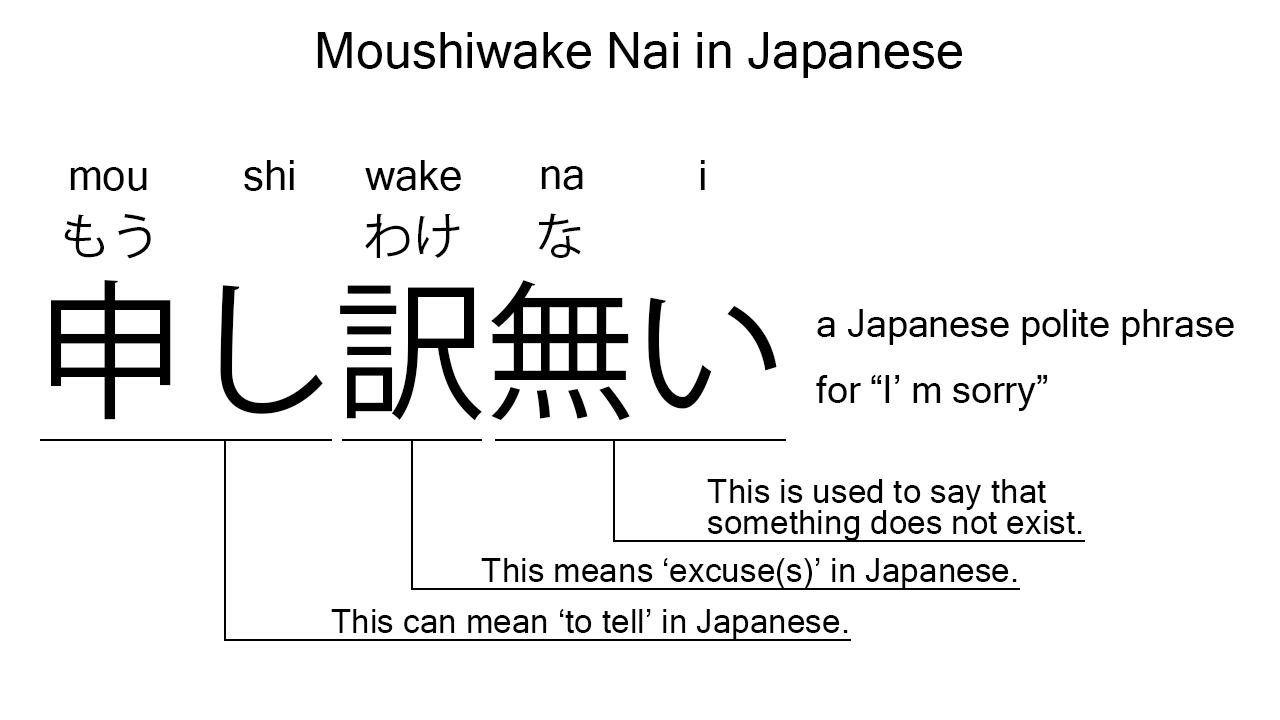What does “moushiwake nai” mean in Japanese?
Native speakers say “moushiwake nai” often to mean ‘I’m sorry’ politely in Japanese. Perhaps, some Japanese learners know this phrase as it is sometimes used in Japanese movies, novels, manga, anime, and the like. In this blog post, however, I will explain this phrase in detail based on its grammatical components. And also, I will explain how to use it through an example sentence. My explanations would help Japanese learners understand “moushiwake nai” more clearly. Then, let’s get started!
Contents
- Definition and meanings of “moushiwake nai”
- What does “moushiwake nai” literally mean in Japanese?
- Summary
Definition and meanings of “moushiwake nai”
Let me start with the definition and meanings of “moushiwake nai”.
- moushiwake nai – 申し訳無い (もうしわけない) : a phrase meaning ‘I’m sorry’, ‘I apologize’, ‘my apologies’, ‘we are sorry’, or such in Japanese.
The definition and meanings are not that difficult, I think. The meanings seem to be based on the same concept. To understand this phrase more clearly, however, let me explain its grammatical components in detail, one by one.
What does “moushiwake nai” literally mean in Japanese?
The phrase consists of the following three components:
- moushi – 申し (もうし) : one conjugation of the verb, “mousu”, which politely means ‘to tell’ in Japanese. It has been conjugated for the better connection with its following word.
- wake – 訳 (わけ) : a noun meaning ‘excuse’, ‘reason’, or such in Japanese. This can also work as plural. Learn more about Japanese plural.
- nai – 無い (ない) : an i-adjective used to say that something does not exist in Japanese. In the phrase, this is used to deny the existence of excuses to tell.
These three components tell us that the formed phrase literally means ‘there is no excuse to tell you’ politely in Japanese. This literal interpretation is very close to the actual meanings, I think.

When we meet new Japanese phrases, we should check their grammatical components in detail to understand their meanings clearly and deeply. In many cases, components tell us a lot about the meanings of the phrases they form. Actually, here, we could get the better understanding of “moushiwake nai” through the detailed check above.
So far, I’ve explained the definition and meanings of “moushiwake nai” together with its grammatical components. Then, let me explain how to use it through the example sentence below.
Example: how to say “I’m so sorry” politely in Japanese
「moushiwake nai」 to kanojo ga it ta – 「申し訳無い」と彼女が言った (「もうしわけない」とかのじょがいった)
“I’m so sorry,” she said.
Below are the new words used in the example sentence.
- to – と : a case particle working as a quote marker. In the example, this works after the clause to indicate what she said.
- kanojo – 彼女 (かのじょ) : a pronoun meaning ‘she’ in Japanese.
- ga – が : a case particle used to make the subject word or the object word in a sentence. In the example, this is used after “kanojo” to make the subject in the sentence.
- it – 言っ (いっ) : one conjugation of the verb, “iu“, which means ‘to say’, ‘to tell’, or such in Japanese. In the example, it has been conjugated for the better connection with its following word.
- ta – た : an auxiliary verb used after a verb, adjective, or auxiliary verb to make its past tense form. Probably, this is well known as a part of Japanese ta form. In the example, this is used after “it” to make its past tense form, “it ta”.
This is a typical usage of “moushiwake nai”. In this example, it works to mean “I’m so sorry” in Japanese. When we want to express deep apologies in Japanese, this phrase is a good option.
Summary
In this blog post, I’ve explained the definition and meanings of “moushiwake nai” in detail based on its grammatical components. And also, I’ve explained how to use it through the example sentence. Let me summarize them as follows.
- moushiwake nai – 申し訳無い (もうしわけない) : a phrase meaning ‘I’m sorry’, ‘I apologize’, ‘my apologies’, ‘we are sorry’, or such in Japanese. This consists of three components: “moushi”, “wake”, and “nai”. These three literally mean ‘there is no excuse to tell you’ politely in Japanese. This literal interpretation is very close to the actual meanings, I think. When we want to express deep apologies in Japanese, this phrase is a good option.
Hope my explanations are understandable and helpful for Japanese learners.